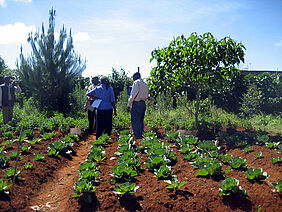In Europe, the advantages of organic farming have been shown repeatedly, but how does organic farming perform in countries in the South? Can organic farming be successful under tropical and subtropical conditions? In 2007 FiBL began long-term system comparisons in Kenya, Bolivia, and India that should provide some answers. The trials compare organic with conventional farming systems and are expected to provide at least 10-20 years worth of data. The trials will give data on, among other things, the development of yield, fertility, and biodiversity, as well as nutrients and energy efficiency. The ultimate deciding factor for farmer families, however, is economic viability. In India, the FiBL trial is researching various cotton farming systems, in Kenya a corn-vegetable crop rotation is being tested, and in Bolivia the trial consists of cocoa in various agroforestry systems.
The trials are financed by BioVision, Coop Sustainability Fund, the Swiss Agency for Development and Cooperation, and Liechtenstein Development Service. The scientific lead of this long-term system comparison is FiBL in Frick, Switzerland, which belongs to the world’s leading research institutes for organic agriculture.
More information
FiBL Contacts
- Lukas Kilcher, FiBL, Kommunikation , Tel. +41 (0) 62 865 7262
- Jacqueline Forster-Zigerli, FiBL, Kommunikation, Tel +41 (0) 79 704 7241
Links
- Tropentag Conference information: www.tropentag.de




